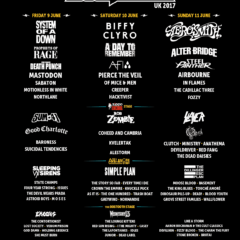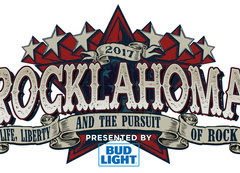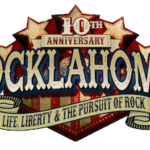If you have turned on the television and caught an episode of the ABC hit Fresh Off the Boat, or Don’t Trust the B… in Apt. 23, you have heard the work of Craig Wedren. Going from his band, Shudder to Think, into film and TV score production was an easy move for Wedren, and we had the chance to talk to him about the transition, his solo work, and what it means to talk to your nineteen-year-old self. Make sure to catch his latest work in the movie, How to be a Latin Lover, in theaters now.
Thank you so much for taking the time to talk to me today. Let’s start off talking about the latest track, “No Estoy Triste” from How to be a Latin Lover. I enjoyed this track a lot.
Thank you.
You’re welcome; I like it. I’m not usually one to sit through the credits and listen to the final music of a movie, but now I really thing I need to! I’m afraid I am missing some really good stuff by not doing that!
Yeah, there are always some fun little treats in the credits. Actually, this song precedes the credits. There is a final scene in the movie, and then there is a big epic end credit section. So, the idea is to keep you in your seat to pay attention a little bit longer. But thanks, I really appreciate that!
Well, yeah, I like that the idea is to keep the viewer viewing, I guess you could say. I am just curious as to how you got started with this. I know you were in Shudder to Think, so was moving into movies and TV the next transition for you in terms of creative movement and energy? Was it a relatively seamless process?
I was very fortunate in that it was relatively seamless. It was something that I was doing all throughout college while Shudder to Think was making records and touring. I sort of had this alter ego where I went to NYU, and a lot of friends of mine were in the film school. And because I was “Guy in Band With Real Records,” people were like, “Oh you’re a music guy! I need music for my student film!” Or for their experimental theatre pieces, or for the comedy theatre group The State, which was just getting started.
They needed music and sound design and things like that. And I was always an avid home recording enthusiast. I had my little cassette four track and turned it into an eight-track. And now I have a nice big recording studio in my backyard where I do all of my film and TV scores and make all my records. So, it’s been a gradual, natural repetition of me doing the exact same thing year after year since I was twelve years old. And it sort of gets bigger by drips.
So, it’s like a snowball, but it’s not growing as quickly as a snowball would that’s rolling downhill…
Yes, exactly. It’s like a “slowball.” It’s definitely a “slowball.” (laughs)
(laughs) A slowball. I like it; that’s great. Now, that is just so cool to me because you’ve been doing this since you were twelve. So, basically, you’re just living your dream that you had forever. You’ve just made it your livelihood.
Kind of. Especially the last few years because I’m 47 now, and I have a nine-year-old son, so I see a lot of things through his eyes. And then also, I sometimes have these conversations with myself between ages twelve and nineteen.
Because when – and I don’t know about you – but when I was between 15 and 19, I was at my most self-righteous and snobby about what was cool or authentic and what had integrity. So, every once in a while, I will nervously check in with my twelve- or seventeen-year-old self. I’ll be like looking down the long end of the telescope to kind of check in and see how that guy thinks I am doing. And usually, I am like, “All right, this is pretty cool.”
Craig Wedren
The thing that would have freaked me out most at age fifteen to see me now in the other end of the telescope would be like, “Oh my god, what happened to your hair?” (laughs) That would be the most shocking thing, so that’s a good gauge for me.
That’s a very good gauge if the only thing your younger self would be worried about is the state of your hair. I mean, not fashion because God knows we have all made some tragic fashion mishaps along the way…
(laughs) Oh yeah, there’ve been some horror show, especially at age fifteen. It’s like, come on.
Oh yeah, you always know better in your head until you really do, I guess.
(laughs) Yeah, absolutely. That’s so true.
I think that’s key as an artist. I mean, as a writer, I never would have ever imagined I would get to do the things I do. I mean, I am here talking to you, which is wicked. And like, my favorite bands know me by name and face because I review their shows and talk to them. It’s surreal, really, and it’s like my twenty-one-year-old self would be crapping her pants, all the time, at the things I get to do. So, that’s a good gauge to look back and see how you’re doing on what your younger self would appreciate and want for you.
Yeah, yeah. But then, you know what, my wife and I occasionally see this awesome therapist. And I was going through a “What am I doing with my life? Have I completely sold out? Have I sold my younger self out?”
She was like, “Dude. You were an idiot when you were fifteen. Don’t listen to that guy. He was dumb. He was a wannabe rockstar, so what did he know?” So, I guess it goes both ways. (laughs)
Of course, and it’s good to have someone else tell you when you’re being an idiot. (laughs)
Exactly.
You started out in the band, Shudder to Think, and some have said that you guys broke tradition and signed with a major label, almost like you sold out. As far as I am concerned, if you want to make a dime, you have to do what you have to do. You can’t wait for it to come to you.
You found yourselves on some pretty big tours with acts like The Smashing Pumpkins and Pearl Jam (which would make my nineteen-year-old self about piss her pants!). So, did you feel like you were doing the dirty, if you will, by moving into that realm and abandoning DIY, hardcore roots you had? Was it an easy decision to make?
I can only speak for myself, and I suspect that other members of Shudder to Think had different ethical relationships to the so-called “scene.” But, I grew up in Cleveland. And in Cleveland, it wasn’t a big deal to me. What was important was making great music and connecting that music to as many people as possible.
So, my thing was never sociopolitical. It was more creative and good old fashioned, Midwestern, puritanical work ethic. And so when I moved to DC, it was a much more purist. And while I appreciated that and respected that, it wasn’t a thing for me. I was like, “We’re going to make our weird music, and we are going to take it as far as we can.”
We went from Dischord Records, which is the indie-est of indie labels and people whom I love and adore to this day, and we signed to Epic because we could. They signed us based on our own music we were making, and it wasn’t until the very end that anybody ever said that we needed to make some changes. We knew then that it was time to move into film contracts because we knew we weren’t long for that.
It’s interesting because as a band, Shudder to Think got into film soundtracks, which then I continued to do along with another band member, Nathan Larson. As a composer, I love taking direction. I have to do it; I can’t work without it. But, as an independent band member and songwriter, you get into it to not take direction because you want to be self-directed, right?
So, pretty much the minute that boy bands and the Internet and Korn started happening, and we started getting odd directives from the label, that was the point that we were like, “Yah, let’s start transitioning. A lot of our friends direct movies.” I had done a lot of soundtrack stuff in college, so it was a very natural transition. We were also sick of each other being in a band together, being on the road together. So, I often think that we got out just under the wire, before the music industry changed as it did and everyone wanted to do film soundtracks.
Right. It sounds like you got out right before VH1 could make a Behind The Music about you and life on the road….
(laughs) Right, and how we became cannibals and ate each other to survive.
I knew it! So that’s what happened to you guys! (laughs)
(laughs) Yeah, that’s what happened.
Well, I am glad it worked out the way it did because we wouldn’t be here today if it hadn’t.
Right, it would be a great Behind the Music, but I would not have been around to appreciate it.
Well, one of my favorite shows you have worked on was Don’t Trust the B…in Apt. 23. I loved that show and was so sad when it got cancelled. And I also really like Fresh Off the Boat, which means it will cancel because that’s pretty much how my life goes…haha.
We just finished the third season last week, so hopefully it continues to go.
Oh, I hope! So, the process for creating music for films and TV must be so different. What are some of those differences, and how does the process work for both?
With a movie, I have the time to create a single body of music that goes over an hour and a half to two hours. So, I generally spend three to six months working on it. With TV, it’s machine-like.
So, on a Monday, I go into the room with the creator of the show. We go through an episode, decide where there needs to be music and what the music needs to do. And then by Thursday, my team (Pink Ape) and I get together to create a half an hour’s worth of music. We turn it by that Wednesday or Thursday, get a bunch of notes, work on it over the weekend, and then the TV show adds it that following Monday.
So, we create a half an hour’s worth of music every week. Like clockwork. This is opposed to music for films, where we do it over months. So, I use different muscles, so to speak, but it’s been great for me.
In Shudder to Think, I had a tendency to really get lost up my own navel when I was writing, for better and for worse; it made for some really interesting and unique stuff, but then I was also miserable a lot of the time.
With film and TV, it’s that writer’s adage, just keep your pen moving. Move your pen. And something will happen. Over a period of years, I have gotten really good at sitting down on a dime and writing music, which feels great. That’s definitely the best thing about TV is that it forces you to write.
In movies and TV, the music is the final character. Everything else has been written. The show has been edited. So, there is one final character that you’re adding, and it’s nonverbal – it’s purely emotional.
Now, you’re also a solo artist with a new album coming out soon. Tell me how this album is different from your previous releases, Lapland and Wand.
Well, any record is a present tense expression for me. So, when I think about my first solo album – it’s funny you mentioned VH1 before – I thought a lot about music you may hear in supermarkets. So, it was very song-y like that. And so for my second record, I thought about a film project around it. It was very expansive and very overflowing.
Craig Wedren
My third album was the first album I wrote after I moved to LA. It was purely written in LA, which has an effect. It was the first thing that I wrote after becoming a father, so it has a very different texture to it. On the one hand, if I played the songs for you on guitar or piano, they are very direct and clear melodically. But the production is the most experimental I have ever done.
There’s a combination of very abstract production and very accessible melody. Right now, I am in my backyard, looking at all of these succulent plants and all of these crazy varieties of trees. It’s very woodsy, and I think the album feels like that. It’s psychedelic but earthy.
I think I need it! I want to leave you with the final words for the readers. What would your final message to them be?
Learn to meditate; make stuff. Those are the only two things. This has nothing to do with my projects. It has everything to do with my process. Meditate and keep that pen moving!
Interview by Devon Anderson, RockRevolt Managing Editor
Connect with Craig Wedren (click icons):
Tags: Craig Wedren, Don't Trust The B..., Film Composer, Fresh Off the Boat, How to be a Latin Lover, Lapland, No Estoy Triste, RockRevolt, RockRevolt Magazine, Shudder to Think, Solo Artist, TV Composer, Wand

















 Share On Facebook
Share On Facebook Tweet It
Tweet It































